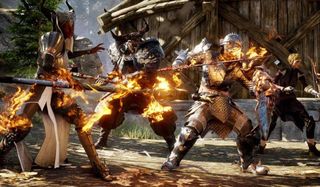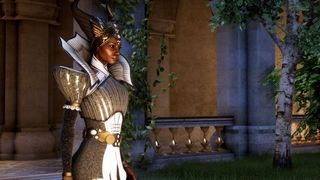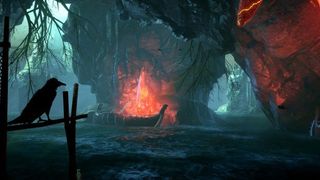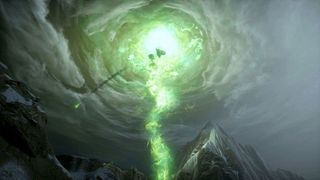Dragon Age: Inquisition hands-on: fine fantasy

Back in the Highlands, there's another bit of that intrinsic storytelling woven into the environment, although I don't pick up on it initially. A stone bridge called Judicael's Crossing is snapped in half. I tap a key to mark the busted infrastructure as an operation point for my Inquisition, then fast-travel back to Skyhold, my castle, and Inquisition's answer to the Normandy in Mass Effect. It's detailed, cavernous, but more importantly, there's more stuff you can do in Skyhold than on Commander Shepard's ship. Past the tavern, stables, courtyard, kitchen, and dungeon (for imprisoning people, not slaying rats, I learn), I step to the War Table. Here, a dozen or so operation markers populate a world map: scouting missions, a task to gain the friendship of the dwarven kingdom of Orzammar or to recruit an arcanist. You complete these micro-quests entirely through the menu, and they grant modest benefits: gold, loot, resources, or adding more 'agents' who join the Inquisition. But some, like addressing the Chantry in Val Royeux, are tied to the main plot.
I spend some of the power I accumulated in the Highlands to rebuild the bridge. Some operations, like this one, are instantly resolved, but others ask you to pick which of your three advisors—Josephine (political), Cullen (military), or Leliana (spying)—is the right fit for the job, making them temporarily unavailable. You can visit with all three of these support characters inside Skyhold.
Also nestled into the War Table (but separated from operations) are Inquisition perks, which draw on influence that you gain from exploring Thedas and completing quests. (If power is “Inquisition gold,” as Darrah puts it, influence is Inquisition XP, effectively.) There are four perk types: Forces, Secrets, Connections, and simply 'Inquisition', the first three of which are tied to those previously mentioned advisors. A Forces perk might increase your potion capacity by four; a Secrets perk might increase the XP you earn from picking up codex entries; one Connections perk grants better merchant offers on rare items. Skyhold changes as a reflection of which perks you favor, although I wasn't told how. It probably won't take the form of decor, considering part of playing Inquisitor means decorating Skyhold manually: everything from the windows, throne, banner, and heraldry to the drapes can be swapped in a menu.

The piece of Skyhold I'm most curious about, though, is the one that was only described to me. As the Inquisitor, BioWare tells me, you'll pass judgment on NPCs who come to Skyhold, characters who typically act as echoes of events in the main storyline. After you rescue Inquisition soldiers from the Ferelden Bog, for example, the offspring of the barbarian leader you kill arrives at the Skyhold front gate, knocking a dead goat against your walls. It's a ritual insult for killing his kin, but you have to decide whether to give this barbarian and his followers weapons and exile them, put him in a stockade, or take a different action.
BioWare sees these judgment sequences as a way of getting players to reflect further on their decisions. “They're an opportunity to ask the player, 'OK, you finished this, you saved the orphanage—how do you feel about that? Why did you do that? It's essentially getting a little bit of motivation from the player because you're asking them to make a subsequent follow-up decision. And often story doesn't do that, it just says, 'OK, you saved the orphanage, hooray!'”

Laidlaw underlines the value on getting players to look backward rather than simply anticipating the next quest. “Inquisition, moreso than many of our other games, takes a moment to just ask 'how you feeling?' and have characters dig into why you did what you did. And to try to understand the Inquisitor's mind. And they're some of my favorite moments in the game,” he says.
Back in the Highlands, I cross that bridge I fixed to explore the new area it's opened up. Before I've fully stepped across, two dragons are in the air above me. They won't attack—dragon encounters aren't dynamic events in Inquisition—but a few minutes and a few more dispatched Red Templars later, I stumble into a den. I'd thought the sky-lizards were just set dressing and spectacle, but they were telegraphing the threat ahead. “Oh look, a dragon. What a perfect way to ruin our day,” my mage, Dorian, quips.
The biggest gaming news, reviews and hardware deals
Keep up to date with the most important stories and the best deals, as picked by the PC Gamer team.
Beginning's end
I like how Inquisition trusts I'll find my own way. It's not a do-anything, kill-anyone sandbox game, nor should it be, but it's encouraging that it seems to be keeping its spirit as a dialogue- and party-driven game intact while embracing the scale the new engine enables. And it's fitting that the end of the main quest won't be the end of your save file—you'll be able to keep playing. That makes sense in an open-world structure, but could it undermine the finality of the ending? I ask Darrah to explain BioWare's approach.
“Often in storytelling you would put a nice bow around everything and then everyone opens up a hotel on the beach and drinks Mai Tais, and you can't do that—you need to leave the world in a relatively unstable state but bring enough resolution so that the story has a satisfying conclusion.”

The end isn't the end, and in a different way, that's one of the most exciting things for me about Inquisition: this four-year investment to reset and broaden Dragon Age can't be a one-off. By the end of our conversation, Darrah admits that “it's fair to say that we have had some thoughts to the future.” If Inquisition is truly the foundation for more Dragon Age, we'll have a lot to enjoy from BioWare's fantasy team in the years ahead.

Evan's a hardcore FPS enthusiast who joined PC Gamer in 2008. After an era spent publishing reviews, news, and cover features, he now oversees editorial operations for PC Gamer worldwide, including setting policy, training, and editing stories written by the wider team. His most-played FPSes are CS:GO, Team Fortress 2, Team Fortress Classic, Rainbow Six Siege, and Arma 2. His first multiplayer FPS was Quake 2, played on serial LAN in his uncle's basement, the ideal conditions for instilling a lifelong fondness for fragging. Evan also leads production of the PC Gaming Show, the annual E3 showcase event dedicated to PC gaming.
Most Popular




